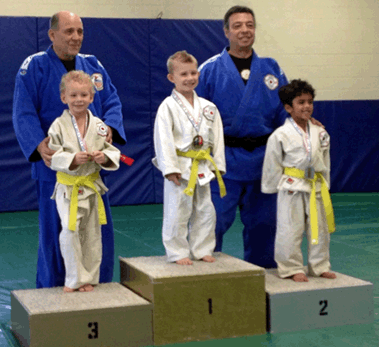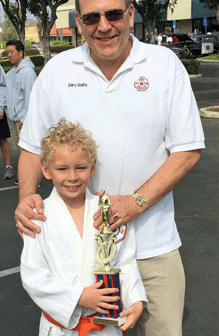The Story of Nicholas, Finding His Way in Judo
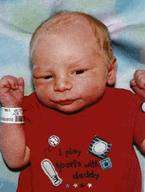
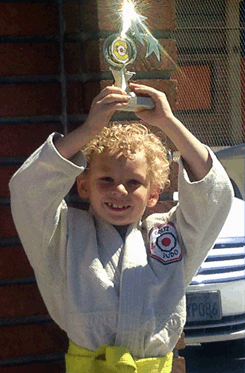
When Nicholas was born everything appeared to be normal. Throughout his first year he hit most of his developmental milestones, except his speech. My husband and I consulted with our family physician at his 12-month appointment because Nicholas was not babbling. Our family physician wanted to wait to see what happened at Nicholas’ 15-month appointment. We first heard the word “Autism” when Nicholas went to his Cranial Facial Specialist at 13-months for a routine check on the helmet he was wearing to correct Plagiocephaly (the flattening of the head). He was checking Nicholas’ developmental milestones and I had mentioned Nicholas was not talking. He thought Nicholas might be Autistic and did a quick little test to watch Nicholas’ reaction to strangers. Nicholas did not have a problem with strangers coming in the room so all seemed fine at the time.
Once Nicholas learned to walk he was all over the place and very active. At 15 months old Nicholas still was not talking and he was referred to Regional Center for testing. Regional Center is an early intervention program for kids under three years of age. Nicholas qualified for Regional Center services to help with his speech.
At 18 months Nicholas had ear tubes put in and his tonsils and adenoids removed. He was starting to babble but his speech was not progressing as fast as we had hoped. Nicholas would have melt-downs (he was crying and inconsolable) between the ages of two and three and we were not sure why.We also noticed Nicholas had a hard time getting along with other children on playgrounds and he did not like trash trucks but we did not think anything of it at the time. Nicholas also developed some sensory issues. For example, Nicholas had an extreme fear and would hysterically cry when the trash truck would come.
When Nicholas was three we joined a group of mom’s who exercised with their children in strollers called Stroller Strides. During one of our workouts one of the mom’s suggested I try Judo for Nicholas. I was looking for something active for him to do and she told me how much Judo had helped her son. At this time Nicholas still had not been diagnosed as being Autistic but I noticed he was very aggressive and would still have melt-downs.
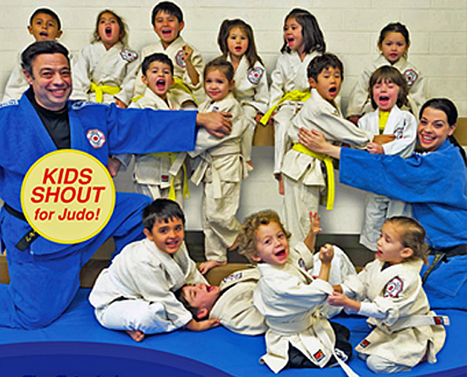
I signed Nicholas up for Judo in the Tiny Tots program with Goltz Judo. During this time we were also trying other sports like soccer and t-ball but they were not a good fit for Nicholas. Nicholas struggled with the team aspect of these sports and turn taking more so than the average child his age. We would discuss with him how he needed to act and he could tell you what was right and wrong. However, when he would get around other children he was very impulsive and aggressive. On our first trip to the dojo Nicholas did not want to go onto the mat. He sat on my lap and observed. The following week he sat in a chair next to me but refused to go out on the mat with his class. Finally, on the fourth week Nicholas went out on the mat and joined the class. Nicholas enjoyed the class and had a lot of fun.
While in Judo and the Tiny Tots program, Nicholas thrived. His Senseis were very good at setting boundaries for him and disciplining him with a time out when he did not behave. I noticed during Judo I would not see Nicholas throwing the tantrums out of frustration like I had seen him do in other sports.
At the age of four Nicholas finally received an official diagnosis of Autism. We were relieved to finally have a name and reason why our child was not behaving like some of his other peers (by this time his speech was age appropriate). When we got Nicholas’ diagnosis, we asked the doctors about the types of activities we should be getting Nicholas involved in. They told us that individual sports would be best for Nicholas because it would allow him to socialize with other kids but he did not need to depend on them like we would need to in team sports.
It took Nicholas about a year to earn his yellow belt. During class he had admired the yellow belts and wanted to be one of them. Over that first year Nicholas had learned how to bow in and out of class. He had learned the warm-up routine and was very excited to go to judo. Nicholas continued learning throws and pins. He learned how to win and lose against his peers (this was not always easy). The routines found in judo were great for Nicholas. They were something he had come to depend on.
Sensei Gary Goltz & Sensei Tony Farah with Nicholas
When Nicholas was between 5 and 6 when we started the transition from the Tiny Tots class to the Olympic Judo “Big Kid” class (as Nicholas calls it). This class had kids in it as young as Nicholas to the age of 12. This transition is overwhelming for most kids but it was especially overwhelming for Nicholas. At the time we were doing the Tiny Tots class one day a week and doing the “Big Kid” class one day a week. After the first class Nicholas was in tears and did not want to go back. I asked him why and he told me it was too hard. The real reason was he was very over-whelmed with the new students and the new class. This was another cross-road judo allowed us to face. I told Nicholas he needed to go back the following week. I new athletically he could handle the class and that I needed to continue to push him out of his comfort zone so he could continue to grow and face Autism head on. I knew that the number of kids in class was very overwhelming for Nicholas and that was part of the reason why he did not want to go back. I did not let him use that as an excuse.
Nicholas slowly grew to enjoy all of the chaos and commotion that comes with a class of that size and level. The structure that is found within the sport of Judo helped Nicholas in the transition. Nicholas knew how to bow in and out and the moves were the same. He learned the warm-up routine (which was a lot more advanced than the Tiny Tot routine) and he began to occasionally socialize with some peers.
Nicholas was between 6 and 7 when he did his first U.S. Judo Association tournament. I specifically chose to have Nicholas do this tournament as his first “Big Kid” tournament because it was at his home dojo. It was a very overwhelming experience for Nicholas to have all of those people around. Since he was younger, he was one of the first groups to fight. It was a double elimination tournament and Nicholas was eliminated after two matches. He fought hard. However, I was very proud of him for not quitting when he go uncomfortable with all of the people around.
After the tournament Nicholas continued to go to practice but we did not do another tournament for a couple of months. The next tournament was not at his dojo. It was at a high school gymnasium. On the way to the tournament we talked about how we were going to some place new but his teammates would be there. Nicholas was excited to see his teammates as they arrived. It was time for warm-up and Nicholas did the warm-up with his team. After warm-up Nicholas came off the mat crying. When I asked him what was wrong he said he wanted to go home.
I knew that he was feeling very overwhelmed with all of the changes and this was one of those moments that I was either going to teach him how to persevere when he felt uncomfortable or let him succumb to his feelings. I consoled Nicholas and we talked about him going out and doing his best. Even though Nicholas lost both of his matches that day I could not have been prouder of him. He faced his fear and he did not let the Autism control him. He went out and fought his opponent and the Autism.
The next month Nicholas had another tournament at his home dojo. It was a scrimmage and he was no longer having the severe anxiety about all of the people being there. He did the warm-up with his teammates and went with his group. Again it was a double-elimination tournament. Nicholas had five fights that day and won three. He had won his first metal. However, the Autism and perfectionism that often come with the Autism reared its evil head. Nicholas was mad because he did not get first place. It took us as well as one of his Sensei’s over an hour to convince him that he had achieved a lot.
Judo has allowed Nicholas to grow and learn how to accept things. The following month we did another tournament and Nicholas was the same high school gymnasium he was at a few months prior. Before this tournament Nicholas’ anxiety was getting the best of him and he was really nervous. The night before he did not want to eat and his stomach hurt. He had a hard time falling asleep from the nerves. In the morning he was hiding because he did not want to go. This was another point where I had to make the decision to let the Autism win or teach Nicholas how to fight the Autistic tendencies that come so naturally to him.
I stayed calm and told him we would get his favorite breakfast on the way to the tournament. That got him excited about going. On the way to the tournament (it was at the high school gymnasium he had previously been to) Nicholas ate his breakfast. When we arrived at the tournament Nicholas saw one of his buddies and his sisters in the parking lot. He was excited they were already there. Nicholas did his warm-up and did not come off the mat crying. It was great to see his growth (I have learned to appreciate the little accomplishments).
Nicholas fought in his flight again and won a third place trophy. When he lost a match he handled it with maturity and this time he was very proud of his third place.
Sensei Gary Goltz with Nicholas
I know our adventure with Nicholas and judo is not over. Nicholas is currently working on earning his orange belt. Throughout the years Judo has help Nicholas work on impulse control (a problem for many Autistic children) as well as socialize with other children. Judo has taught Nicholas the discipline needed to have appropriate interactions with peers and adults. Last, judo has helped Nicholas face all of the natural tendencies that Autism brings. Each day is a battle with new challenges. Nicholas continues to amaze all of us (including his Sensei’s) and judo has been an amazing combination of therapy and physical activity for Nicholas.
